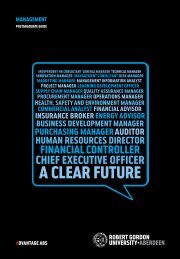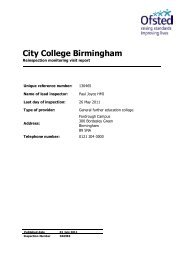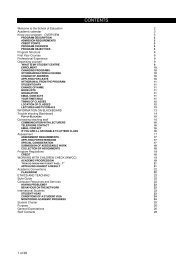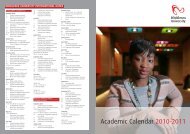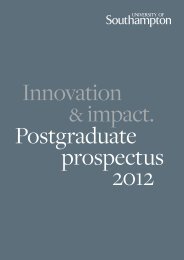UEA London prospectus 2012â2013 - University of East Anglia
UEA London prospectus 2012â2013 - University of East Anglia
UEA London prospectus 2012â2013 - University of East Anglia
Create successful ePaper yourself
Turn your PDF publications into a flip-book with our unique Google optimized e-Paper software.
Direct entry to the second year <strong>of</strong> a university degree<br />
Module descriptions<br />
Introduction to Business<br />
This module provides you with a basic<br />
understanding <strong>of</strong> business and management.<br />
Topics include: models <strong>of</strong> management; the<br />
business environment; managing people;<br />
leadership; corporate social responsibility;<br />
organisational culture; human resource<br />
management; managing change; corporate<br />
strategy; marketing; organisation structure;<br />
finance; and budgets.<br />
Developing Business Skills<br />
The module encourages you to develop key<br />
management skills that will help to prepare for a<br />
future career in business and management. Topics<br />
include: management skills and managerial<br />
effectiveness, self-awareness: understanding and<br />
developing yourself; personal development<br />
planning; planning and goal setting; working in<br />
teams; management projects; report writing; written<br />
communication and email; managing meetings;<br />
obtaining data and information; oral presentation<br />
skills and interpersonal communication.<br />
Organisational Behaviour<br />
This module builds up your appreciation <strong>of</strong> the<br />
nature and historical development <strong>of</strong> organisational<br />
behaviour. The module introduces key concepts,<br />
theories and methodologies in organisation<br />
behaviour, and develops an understanding <strong>of</strong> the<br />
linkages between research, theory and practice.<br />
Information Systems and<br />
Business Research<br />
The module introduces you to the use <strong>of</strong><br />
management <strong>of</strong> business applications <strong>of</strong><br />
information and communication, the use<br />
<strong>of</strong> Micros<strong>of</strong>t Excel and elementary statistical<br />
methods used in business and business research.<br />
Topics covered include: business systems and<br />
information systems; back-end and front-end<br />
information systems infrastructure, access devices<br />
and channels; electronic delivery <strong>of</strong> goods and<br />
services; the Internet and the web; back and<br />
front-end ICT infrastructure; data security; the<br />
social, economic and political environment <strong>of</strong><br />
e-Business; B2C, B2B and C2C, e-Commerce,<br />
e-Marketing and e-Procurement, e-Business<br />
planning, strategy and management; e-Business<br />
development and evaluation; graphical<br />
representation <strong>of</strong> data; numerical measures <strong>of</strong><br />
central tendency; numerical measures <strong>of</strong><br />
dispersion; introduction to probability; numerical<br />
outcomes; common patterns in data; continuous<br />
numerical outcomes; and the normal distribution.<br />
Economics for Business<br />
The module introduces you to issues <strong>of</strong> central<br />
concern in business economics and introduces to<br />
the economic environment in which businesses are<br />
located. Topics include: the demand curve;<br />
responsiveness <strong>of</strong> demand; the concept <strong>of</strong> cost;<br />
the supply curve; markets in action; market<br />
structure and competition; monopoly; growth;<br />
externalities; the labour market; conflicts <strong>of</strong> interest;<br />
transaction costs; introduction to macroeconomics;<br />
aggregate demand and aggregate supply; GDP;<br />
Inflation, fiscal and monetary policy; unemployment;<br />
and global economics.<br />
Introduction to Financial and<br />
Management Accounting<br />
The module provides you with a firm foundation<br />
in the theory and practice <strong>of</strong> accounting. The<br />
module assumes no previous studies <strong>of</strong><br />
accounting and covers the following topics:<br />
the balance sheet, the pr<strong>of</strong>it and loss account,<br />
the double entry system, adjustments <strong>of</strong><br />
accounting, accounts <strong>of</strong> limited companies,<br />
costing, budgeting and variance analysis.<br />
English Language and Study Skills<br />
A score <strong>of</strong> 65% (60% minimum in each<br />
component) is required for entry to year two<br />
<strong>of</strong> an undergraduate degree course. The English<br />
Language and Study Skills module will help you<br />
reach this level <strong>of</strong> pr<strong>of</strong>iciency. During the module<br />
you will:<br />
• improve your ability to deal with complex<br />
academic texts<br />
• develop your critical ability in relation to<br />
academic writing<br />
• develop your fluency and confidence in<br />
academic discussion<br />
• enhance your ability to extract information from<br />
spoken texts.<br />
The module will include an investigative project<br />
involving research, data collection and analysis,<br />
and a written and oral presentation <strong>of</strong> methods<br />
and results.<br />
The International Diploma in Business is a very interesting and<br />
varied programme. For example, many <strong>of</strong> us hadn’t studied<br />
Organisational Behaviour before but after a little while I found<br />
myself using the terminology that I had learnt when I was<br />
interacting with other people, so it is very helpful for us.<br />
Shayan Moinuddin, Pakistan<br />
INTERNATIONAL Diploma IN Business<br />
grade: 67% | now studying international business management<br />
at uea london<br />
41





